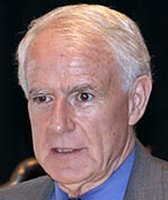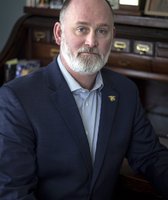Get PolitiFact in your inbox.
Democratic governor candidate Tom Barrett says Scott Walker would ban stem cell research
Stem cells hold the potential to treat, and even cure, some of our most deadly and debilitating illnesses, including heart disease, stroke, Alzheimer’s and diabetes. To make the cells do their magic, research is needed — and the University of Wisconsin has been at the forefront of that work.
But for many people, there is a tension between conducting such research and protecting the sanctity of human life. The dilemma confronts not only scientists, but politicians, who are able to set government funding priorities and even place limits on the work scientists do.
As in 2006, stem cell research has become an issue in the race for governor.
Just as outgoing Gov, Jim Doyle did four years ago, Democratic nominee Tom Barrett is running a TV ad that paints his Republican opponent — Scott Walker — as extreme on the issue.
The ad features a mother talking to the camera about her son, who has juvenile diabetes. She describes how stem cell research "gives our family hope, hope for a cure," and she continues with a blunt declaration:
"Scott Walker says he would ban stem cell research in Wisconsin. That’s right, ban it."
It is the mother making the statement. But as the candidate, Barrett is responsible for the content of the ad. Indeed, as the mother speaks, the words "Scott Walker says he would ban stem cell research" appear on the screen.
Before we can evaluate the accuracy of Barrett’s claim, we need a brief explanation of stem cells and the current state of science.
Here are some key points from a primer by the National Institutes of Health:
Stem cells are important for two reasons: As a generic type of cell, stem cells can renew themselves through cell division. Moreover, they can be induced to become specific tissue or organ cells that have special functions. That gives stem cells their potential to treat, and someday even cure, a number of diseases.
Scientists work with two types of stem cells: embryonic and adult. Embryonic stem cells are derived from an embryo, which science defines as the "developing organism from the time of fertilization until the end of the eighth week of gestation, when it is called a fetus." Adult stem cells, in contrast, come not from a developing organism but from the body.
Embryonic stem cells have a crucial advantage: With regard to treating diseases, embryonic stem cells can become all cell types of the body. Adult stem cells are thought to be limited to differentiating into different cell types of their tissue of origin.
The embryonic-adult distinction is critical, though it is not mentioned in the TV ad.
The mother in the ad is Heidi Fallone. She and her husband, Edward, are two of the six members of the board of directors of Wisconsin Stem Cell Now, a group that advocates specifically for embryonic stem cell research.
Heidi Fallone’s connection to the group is not mentioned in the ad. She is presented as an average mother, with her message packing an emotional wallop as strong as the words: Walker would ban stem cell research.
In truth, Walker’s comments on the topic have expressed support for stem cell research generally — but not if it involves embryos.
It is a line that many candidates have drawn, including Mark Green, who was the subject of Doyle’s attack in 2006. In his ad, Doyle used a Verona mother, pictured with her young daughter, who has diabetes. The mother said Green would "outlaw stem cell research."
In the 2010 campaign, Walker and his campaign staff have issued various statements, including two in August, that spell out his position.
In one, a day after a U.S. district judge shut down federal funding of all research involving embryonic stem cells, a Walker aide said, "We can realize the potential of stem cell research without destroying human embryos or resorting to human cloning. We can both protect the earliest stages of life and find cures."
In another statement, also in the wake of the judge’s ruling, Walker himself said that "science has shown us repeatedly that you can have successful stem cell research without destroying a human embryo."
As an alternative to embryonic stem cell research, researchers have been developing techniques to reprogram adult cells back to the embryonic state. But recent studies have revealed problems. The reprogrammed cells appear to retain a memory of their previous role — as skin, for example — and differ in subtle ways from embryonic stem cells.
In response to questions, the Barrett campaign has defended its TV ad.
Campaign spokesman Phil Walzak told the Associated Press: "Embryonic stem cell research is stem cell research, Walker wants to ban it — he wants to ban stem cell research."
The statement, though, shifts the debate. No one disputes that Walker opposes embryonic stem cell research.
As additional support, Walzak provided PolitiFact Wisconsin two newspaper articles and a survey Walker completed for the group Pro-Life Wisconsin. But the material, like other items cited, showed only that Walker opposes embryonic stem cell research, not that he wants to ban all stem cell research.
In an interview, Walzak said the Barrett ad is accurate because it is widely known that only embryonic stem cell research — not adult stem cell research — is being debated in terms of a research ban.
However, since the ad began running, Barrett has altered his message. An e-mail sent by Barrett’s campaign to supporters, signed by Fallone, says Walker would ban "critical" stem cell research. It goes on to criticize Walker’s opposition to embryonic stem cell research.
If anything, that underlines how inaccurate the TV ad’s language is.
So, where does that leave us?
Democrat Tom Barrett is running a TV ad claiming his opponent for governor, Republican Scott Walker, "would ban stem cell research in Wisconsin." In truth, Walker has repeatedly said he supports research involving adult stem cells, but opposes research involving embryonic stem cells. That is a critical distinction in the world of science — and of politics. Barrett’s ad ignores it, presenting Walker as so extreme on the matter that he is "against hope."
We rate Barrett’s claim False.
Our Sources
Associated Press, Wisconsin GOP governor candidate Scott Walker calls Democrat Tom Barrett's ad on stem cells a 'lie' in Green Bay Press-Gazette, Oct. 3, 2010
Barrett for governor campaign, Fallone ad, Oct. 1, 2010
Barrett for governor campaign, e-mail to supporters, Oct. 7, 2010
Doyle for governor campaign, 2006, Six Times TV ad
E-mail and telephone interview with Barrett for governor campaign spokesman Phil Walzak, Oct. 7 and 8, 2010
E-mail interview with Walker for governor campaign spokesman Jill Bader, Oct. 6 and 8, 2010
Interview with Pro-Life Wisconsin Director of Legislative Affairs Matt Sande, Oct. 8, 2010
JSOnline.com, Green blasts Doyle ad, defends record, July 24, 2006
Milwaukee Journal Sentinel, Ruling shuts down $70 million in stem cell projects, Aug. 24, 2010
National Institutes of Health, Stem Cell Basics
Wisconsin Stem Cell Now website
WITI-TV, Gubernatorial candidates differ on funding stem cell research, Aug. 26, 2010.
Browse the Truth-O-Meter
More by Tom Kertscher
Democratic governor candidate Tom Barrett says Scott Walker would ban stem cell research
Support independent fact-checking.
Become a member!
In a world of wild talk and fake news, help us stand up for the facts.




























